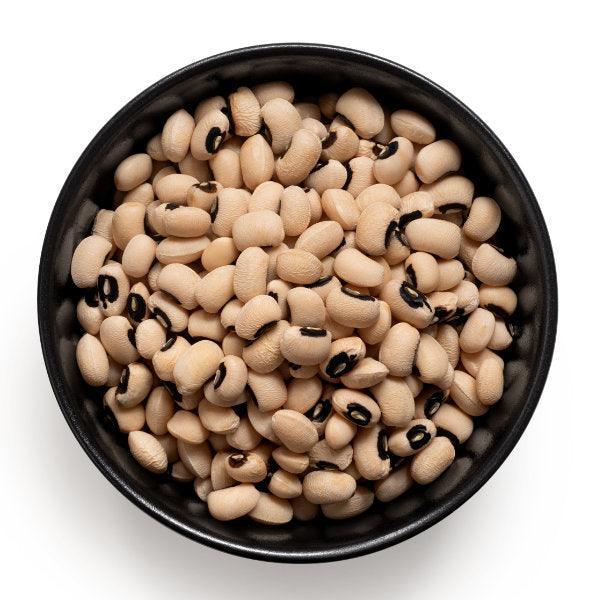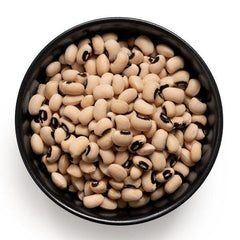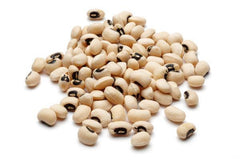





Description
xBlack-eyed beans, also called black-eyed peas or cowpeas, are a highly nutritious legume that boasts an impressive array of health benefits. Popular in both Indian and traditional Southern cuisine, these beans are a staple ingredient in many hearty and flavourful dishes.
Packed with protein and fiber, black-eyed beans are a favorite in vegan and vegetarian diets. Their earthy, slightly nutty flavor and soft yet firm texture make them a versatile addition to recipes ranging from stews, curries, and soups to salads and side dishes. They also absorb seasonings beautifully, enhancing the flavors of any meal.
What Are Black-Eyed Beans?
Black-eyed beans are creamy beige legumes with a distinctive dark "eye." Cultivated worldwide, they are celebrated for their long shelf life, ease of preparation, and nutritional value. Beyond their culinary appeal, they offer health benefits like supporting weight loss, improving digestion, and promoting heart health.
Nutritional Profile
Black-eyed beans are nutrient-dense and loaded with essential vitamins, minerals, and beneficial compounds:
- Protein: 13g per 1-cup serving (170g)
- Fiber: 11g per 1-cup serving
- Calories: 194 per 1-cup serving
-
Key Micronutrients:
- Vitamins: Folate, thiamine, riboflavin, vitamin B6
- Minerals: Copper, iron, magnesium, phosphorus, potassium, selenium, zinc
- Polyphenols: Powerful antioxidants that help protect against cell damage and inflammation.
Potential Health Benefits
1. Supports Weight Loss
The high protein and soluble fiber content in black-eyed beans helps reduce hunger and keep you feeling full for longer. Protein lowers ghrelin (the hunger hormone), while fiber slows digestion, promoting satiety.
Research also shows that regular consumption of beans is associated with a 23% lower risk of belly fat and a 22% lower risk of obesity compared to non-bean eaters.
2. Improves Digestive Health
Rich in soluble fiber, black-eyed beans promote healthy digestion. This fiber increases stool frequency, making it helpful for relieving constipation, and encourages the growth of beneficial gut bacteria. Healthy gut bacteria can improve digestion, reduce inflammation, boost immunity, and even lower cholesterol.
3. Promotes Heart Health
Consuming black-eyed beans regularly can help lower total and LDL (bad) cholesterol levels, reducing heart disease risk. Additionally, their anti-inflammatory properties and high potassium and magnesium content help regulate blood pressure, further supporting cardiovascular health.
4. Rich in Antioxidants
The polyphenols in black-eyed beans act as antioxidants, protecting cells from oxidative stress and reducing the risk of chronic diseases like cancer and heart disease.
Cooking Instructions
- Rinse the beans thoroughly.
- Soak for 5 hours or overnight.
- Place beans in a pot, ensuring at least 2 inches of water above them. Bring to a boil.
- Reduce heat and simmer for 45 minutes to 1 hour, checking water levels and adding more if needed.
Black-Eyed Beans FAQ
Q: What are black-eyed beans?
A: Black-eyed beans are legumes cultivated worldwide, known for their creamy texture and nutty flavor.
Q: Are they rich in protein?
A: Yes, they provide approximately 13g of protein per 1-cup serving (170g).
Q: Are they a good source of fiber?
A: Absolutely! They contain 11g of fiber per 1-cup serving.
Q: What nutrients do they contain?
A: They’re packed with folate, thiamine, riboflavin, and vitamin B6, as well as minerals like copper, iron, phosphorus, magnesium, and zinc.
Q: Are they low in fat?
A: Yes, black-eyed beans are naturally low in fat, with only about 0.9g per 1-cup serving.
Q: Are black-eyed beans and black-eyed peas the same?
A: Yes, they are different names for the same legume.
Why Add Black-Eyed Beans to Your Diet?
With their rich flavor, high nutritional value, and versatility, black-eyed beans are a simple way to elevate your meals while supporting your health. Whether as a hearty addition to soups and curries or a protein-packed salad topper, these beans are as delicious as they are nutritious. Try them today and discover their incredible benefits!
- Choosing a selection results in a full page refresh.


